
INOMICS Salary Report
Economist Earnings by Job Title and Degree in 2023
Read a summary using the INOMICS AI tool
Aspiring economists may be curious to know: how much do economists earn in different types of jobs? The INOMICS Salary Report contains a wealth of data about economist pay by job title and region (among many other factors). This article takes Salary Report data on salaries by job title and analyzes it from a new angle, including highest degree earned, which will help younger economists to plan their career path.
We begin by examining the average earnings of economists by various job titles around the world.
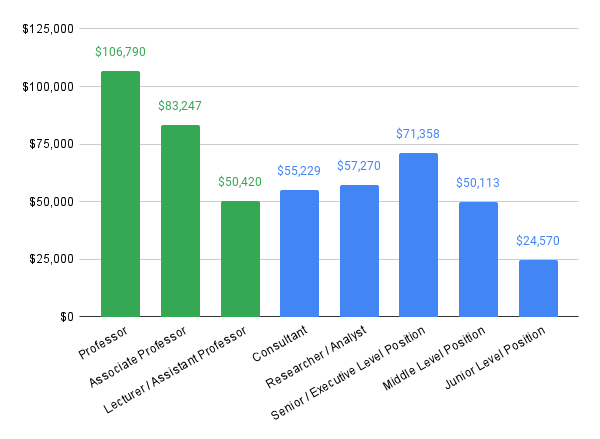
Figure 1: global average salaries by job title (global data, PPP-adjusted)
Average salaries for economists follow a clear trend globally. Unsurprisingly, there is an increase in earnings as academic economists are promoted from Lecturer/Assistant Professor level to Associate Professor and finally full Professor status. Similarly, industry economists continue to earn more as they rise from Junior Level Positions to Middle Level Positions and finally Senior/Executive Level Positions. Consultant and Researcher/Analyst roles out-earn Middle Level Positions, and earn less than Senior/Executive positions.
Note that these numbers are slightly different than what can be found in the INOMICS Salary Report’s Figure 12 (for example). This is because Figure 1 is a simple average rather than a cross-segment average, which the Salary Report utilizes.
One surprising result from Figure 1 is that academic economists out-earn industry economists by a substantial margin. Regionally, however, this pattern does not always hold true; in the INOMICS Salary Report we find that academic economists typically earn less than industry economists until they are promoted to a full Professor of Economics, at which point they tend to earn as much as the highest-paid industry earners. This phenomenon can be seen in the Salary Report’s “Regional Analyses of Academic and Industry Economist Salaries by Job Title” subsection.
Here, in Figure 1, the reason academic economists out-earn their industry counterparts is due to the geographic distribution of survey respondents in worldwide data; 45% of the survey respondents in academic roles are from the high-paying “Global West” region while only 30% of industry respondents are from this same region, skewing the results downward for industry roles compared to academic (the “Global West” region is defined below). Nevertheless, this global data paints an excellent first ballpark picture of what economists can expect from their earnings.
One important consideration that aspiring economists will have to make is whether or not they ought to study for an economics PhD, as a pay increase is expected upon earning this highest level of degree. Let’s examine how Figure 1 changes when we consider economists who hold a PhD versus those with a Master’s degree.
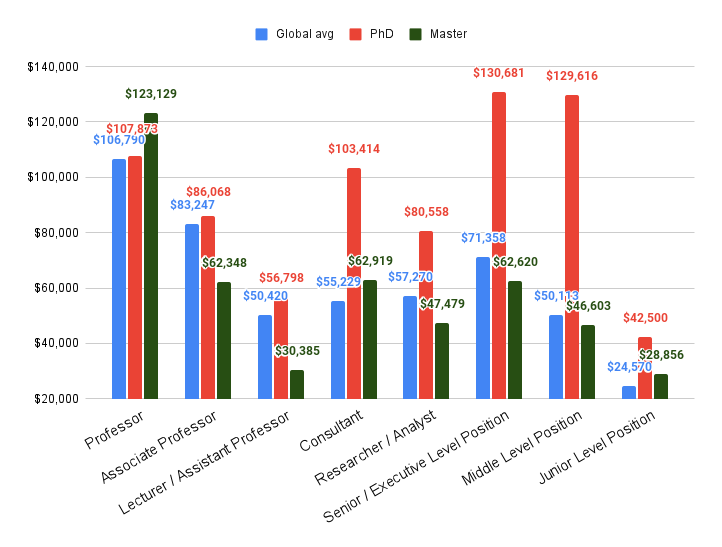
Figure 2: Global average salaries by job title and highest degree held (global data, PPP-adjusted)
Figure 2 begins to paint a more nuanced picture of economist earnings by job title. In almost every case, holding a PhD has increased earnings by job title substantially. This is especially true for industry economist jobs globally, particularly for Middle Level and Senior/Executive positions. In both of these cases, earnings more than double for economists with a PhD compared to a Master’s.
One interesting exception is for the full Professor category, where Master’s-degree-holding Professors out-earn PhD Professors. This does not appear to be a mistake. First, the sample size for Professors of Economics with a Master’s degree is dwarfed by the sample size of PhD Professors (only 5 Professors of Economics hold a Master’s degree compared to 103 PhD holders). This speaks to the fact that in order to pursue a full professorship, economists should expect to earn a PhD as a minimum job requirement in most cases.
Further, the few Professors holding a Master’s degree and not a PhD have decades of experience in economics, which suggests that they are probably former industry economists who left industry after decades of work to become professors. These economists were likely earning high salaries in industry, and so command high salaries as Professors due to their bringing a high degree of industry expertise to their new roles as well. While this is not necessarily a typical career path, it’s interesting to note that this route into academia may exist for former industry economists, without a massive drop in salary.
This raises another interesting point: economists with a PhD are probably older on average than those with a Master’s degree. Therefore, we examine years of experience to try and determine if holding a higher degree is truly a meaningful contributing factor to the increased salaries in Figure 2, or if years of work experience is more important for the salary increase.
| Job Title | Avg. Years of Experience (PhD) | Avg. Years of Experience (Master) | Differential |
| Professor | 25.9 | 19.8 | 6.1 |
| Associate Professor | 17.6 | 9.3 | 8.3 |
| Lecturer / Assistant Professor | 9.5 | 8.1 | 1.4 |
| Consultant | 19.4 | 12.5 | 6.9 |
| Researcher / Analyst | 11.1 | 8.2 | 2.9 |
| Senior / Executive Level Position | 20.1 | 13.4 | 6.6 |
| Middle Level Position | 15.7 | 9.8 | 5.9 |
| Lower Level Position | 5.0 | 4.1 | 0.9 |
Figure 3: Work Experience differential in favor of PhD Economists by job title
Figure 3 lists the number of years of work experience on average for each job title category between PhD holders and Master’s degree holders. Column 3 additionally calculates the differential in favor of PhD economists as a simple subtraction. Figure 3 shows that PhD holders do have more years of work experience on average in every category.
However, the average differential is under 7 years of experience, which – while significant – is probably not enough to explain the large salary increases in Figure 2 on its own. Some of the large salary increases are likely due to the relatively higher experience level of PhD holders, but it also seems that earning a PhD greatly increases each type of economists’ earnings independently from experience.
The takeaways, then, are clear: for economists who wish to work in any role, earning a PhD is clearly worth the investment. Industry economists seem to benefit more on average from earning a PhD than academic economists, even though the latter type of economist often must earn a PhD to attain full Professor status.
But before deciding if doing a PhD is right for them, readers may be curious about how this data breaks down regionally. In the remainder of this article, we consider regions with similar levels of pay alongside each other; these are the “Global West” and the “Global South”. The former consists of North America, Western Europe & Scandinavia, and East Asia & Australasia. The latter consists of the Caribbean, South & Central America, Africa, South Asia, Central, Southern & Eastern Europe, and the Middle East, Central Asia & North Africa regions.
Using two overarching regions for the following analyses is useful to grant us a high sample size when breaking job titles down further by category, but in the INOMICS Salary Report we consider each individual region on its own. See the Salary Report 2023 section “Regional Analyses of Academic and Industry Economist Salaries by Job Title” for more information on each specific region’s breakdown.
Breakdown for the Global West
Figure 4 repeats Figure 2 but considers only economist jobs in the relatively higher-earning “Global West” region.
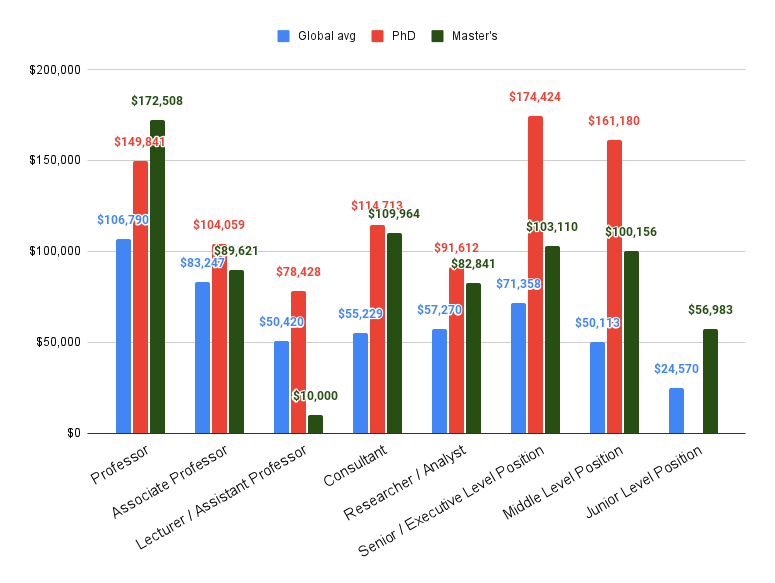
Figure 4: Global West average salaries by job title and highest degree held (PPP-adjusted)
Average salaries in the Global West (Figure 4) closely follow the same pattern as worldwide average salaries (Figure 2), with a few notable differences. First, among respondents from these generally richer countries there were zero survey respondents who held a PhD and were working in a “Junior Level Position”, which is sensible. Second, the massive salary increases for certain categories – particularly Middle Level and Senior/Executive Level Positions – are somewhat less than the worldwide average, though these two categories still feature very substantial salary increases.
Finally, the Professor category features a similar quirk where Master’s-degree-holding Professors out-earn PhD Professors. But again, this is likely due to industry economists who choose to become Professors later in their careers, as the sample size is quite small and the years of experience quite high (in this region, Professors with PhDs have on average about 25 years of experience compared with 38 years for Professors with Master’s degrees). Furthermore, industry economists in these world regions tend to out-earn academic economists, so an industry economist becoming a professor would likely demand a correspondingly high salary.
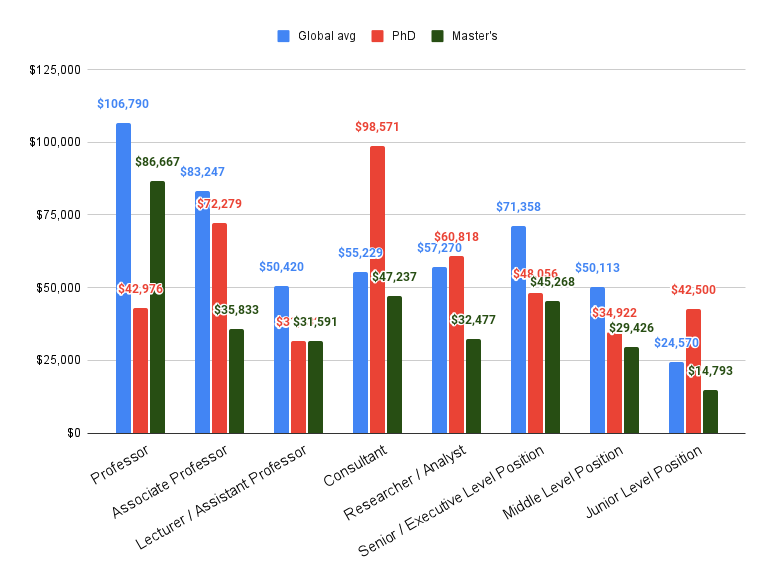
Figure 5: Global South average salaries by job title and highest degree held (PPP-adjusted)
The worldwide trends identified in Figure 2 remain largely true in the “Global South” countries (Figure 5) as well. In these lower-paying world regions, Master’s degree holders earn much more comparable salaries to PhD holders in most industry roles; however, in this region Consultant and Researcher/Analyst salaries increase dramatically for PhD holders. Meanwhile, Professor salaries are quite high for Master’s degree holders. In addition to the aforementioned reasons, in the Global South region it may not always be as strictly necessary for Professors of Economics to hold a PhD (although it is surely still a boon to one’s competitiveness).
Which job titles value a PhD the most?
Overall, then, this article has painted a clear picture: earning a PhD, regardless of job title, improves one’s earning potential significantly in most regions. This is especially true in industry roles, where employers offer a pay premium to compete for sought-after economics PhDs. Academic economists in many regions must earn a PhD in order to be competitive for the full Professor role, though a small portion become Professors after many years in industry.
Excluding the anomalous Professor category, where the rare Master’s degree holders earn very highly, most economist jobs yield higher pay for economists with PhDs compared to those with Master’s degrees. Judging by Figure 2, it appears that Senior/Executive, Middle Level and Consultant roles feature the largest pay increases for PhD holders. Figure 6 below examines the pay differences from Figure 2 in more detail:
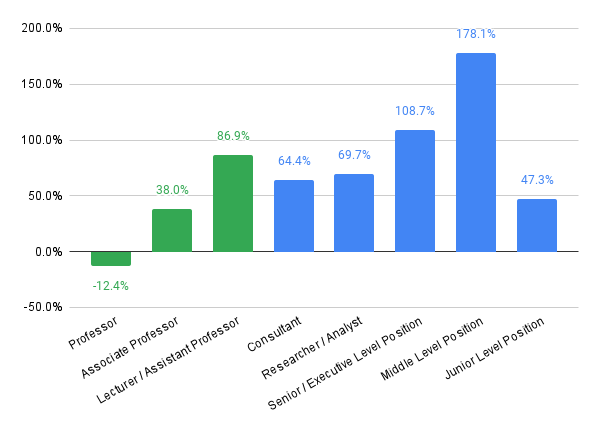
Figure 6: Percentage increase in pay from earning a PhD by job title (worldwide)
Figure 6 shows clearly that economists working in a Middle Level Position stand to benefit the most from earning a PhD compared to their colleagues with a master’s degree, followed by Senior / Executive Level Position economists. Although in Figure 2 Consultants appeared to face relatively high earnings increases, percentage-wise it represents a fairly typical increase among industry roles.
Academic roles feature relatively low earnings increases from earning a PhD, but in order to advance, academic economists are expected to earn PhDs. Again, Professors actually earn less on average if they hold a PhD. But, this is due to the small amount of very high-earning Master’s degree economists who were likely given a professorship after decades of industry experience (as they have higher average years of experience than PhD Professors as well).
Overall – and particularly in industry, where earning a PhD is more of a choice – economists stand to gain a significant amount by furthering their education. Earning 60% or more than their peers without an equivalent degree is a substantial benefit. In the higher-paying world regions, salary increases from earning a PhD are smaller percentage-wise but higher in absolute terms due to high base salaries. Meanwhile in lower-paying world regions, Master’s degree holders earn more comparable salaries to PhD holders in most industry roles (excepting Consultant and Researcher / Analyst roles), though earning a PhD still increases earnings.
The results, then, are clear: in terms of potential salary, earning a PhD is a significant benefit for almost every economist regardless of job title. Of course, pay alone is not the only consideration to make when deciding to earn another degree, and some economists can find meaningful employment with a Master’s degree. But the benefits of a PhD show that aspiring economists should strongly consider planning to complete a PhD in economics at some point during their career, or have strong reasons for not doing so. Otherwise, significant earnings are being left on the table.
For an aspiring economist, the choice of job title and level of education is likely influenced by myriad other factors beyond salary expectations – personal life goals and choices matter, too. And of course, the job titles examined here are overarching categories and not individually specific. However, this data-driven insight can certainly help inform those choices. For more detail about economist earnings by job title and region, see the INOMICS Salary Report, which is available freely for download.
Header image credit: Freepik.com.
-
- PhD Program
- Posted 1 week ago
Graduate Program in Economics and Finance (GPEF) - Fully funded Ph.D. Positions
Starts 1 Sep at University of St.Gallen in Sankt Gallen, Switzerland
-
- PhD Candidate Job
- Posted 2 weeks ago
3 PhD positions at the Vienna Graduate School of Economics (VGSE)
At Vienna Graduate School of Economics - VGSE in Vienna, Austria
-
- Postdoc Job
- Posted 1 week ago
Postdoctoral Researcher (all genders welcome)
At Georg-August-Universität Göttingen in Germany











